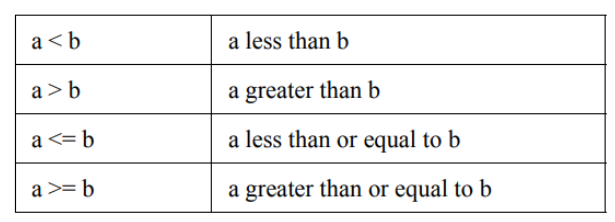Relational operators are used for comparing values. They return a Boolean result indicating the relationship between the operands.
Definitions of rational operator shown in below table-

An expression using these relational operators shall yield the scalar value 0 if the specified relation is false or the value 1 if it is true. If either operand of a relational operator contains an unknown (x) or highimpedance (z) value, then the result shall be a 1-bit unknown value (x).
When one or both operands of a relational expression are unsigned, the expression shall be interpreted as a comparison between unsigned values. If the operands are of unequal bit lengths, the smaller operand shall be zero-extended to the size of the larger operand.
When both operands are signed, the expression shall be interpreted as a comparison between signed values. If the operands are of unequal bit lengths, the smaller operand shall be sign-extended to the size of the larger operand.
If either operand is a real operand, then the other operand shall be converted to an equivalent real value and the expression shall be interpreted as a comparison between real values.